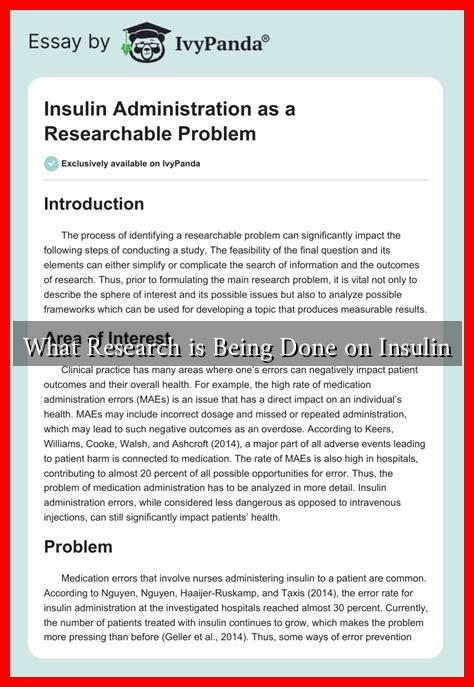-
Table of Contents
What Research is Being Done on Insulin?
Insulin, a hormone produced by the pancreas, plays a crucial role in regulating blood sugar levels. Its discovery in the early 20th century revolutionized diabetes treatment, but ongoing research continues to explore new frontiers in insulin therapy, delivery methods, and the underlying mechanisms of insulin resistance. This article delves into the latest research trends and innovations in the field of insulin.
Advancements in Insulin Delivery Systems
One of the most significant areas of research focuses on improving insulin delivery systems. Traditional methods, such as syringes and insulin pens, are being complemented by advanced technologies that aim to enhance patient compliance and glucose control.
- Continuous Glucose Monitors (CGMs): These devices provide real-time glucose readings, allowing for more precise insulin dosing. Research shows that integrating CGMs with insulin pumps can significantly improve glycemic control.
- Smart Insulin Pens: These pens are equipped with Bluetooth technology to track doses and provide reminders. Studies indicate that they can help patients adhere to their insulin regimens more effectively.
- Inhalable Insulin: Research is ongoing into inhalable forms of insulin, which could offer a needle-free alternative for patients. Early studies suggest that inhalable insulin can provide rapid glucose control without the discomfort of injections.
Innovations in Insulin Formulations
Researchers are also exploring new formulations of insulin that can improve its efficacy and duration of action. These innovations aim to mimic the body’s natural insulin response more closely.
- Ultra-Rapid Insulin: New formulations are being developed that act faster than traditional rapid-acting insulins. For instance, insulin aspart and insulin lispro have been modified to enhance their absorption rates.
- Basal Insulin Analogues: Long-acting insulins like insulin glargine and insulin degludec are being studied for their ability to provide stable blood glucose levels over extended periods, reducing the risk of hypoglycemia.
- Smart Insulin: Researchers are investigating insulin that can respond to blood glucose levels automatically. This “smart” insulin could potentially release more insulin when glucose levels are high and less when they are normal.
Understanding Insulin Resistance
Insulin resistance is a significant factor in the development of type 2 diabetes and metabolic syndrome. Ongoing research aims to uncover the mechanisms behind insulin resistance and identify potential therapeutic targets.
- Genetic Studies: Researchers are examining genetic factors that contribute to insulin resistance. For example, studies have identified specific gene variants associated with increased risk of type 2 diabetes.
- Inflammation and Insulin Resistance: There is growing evidence that chronic inflammation plays a role in insulin resistance. Research is focusing on anti-inflammatory treatments that could improve insulin sensitivity.
- Gut Microbiome: Emerging studies suggest that the gut microbiome may influence insulin sensitivity. Researchers are exploring how probiotics and dietary changes can impact insulin resistance.
Case Studies and Clinical Trials
Numerous clinical trials are underway to test new insulin therapies and delivery methods. For instance, a recent trial published in the journal *Diabetes Care* examined the efficacy of a new ultra-rapid insulin formulation in patients with type 1 diabetes. The results indicated improved postprandial glucose control compared to standard rapid-acting insulin.
Another notable study investigated the use of a dual-hormone artificial pancreas system that delivers both insulin and glucagon. This system showed promise in maintaining stable blood glucose levels in patients with type 1 diabetes, reducing the risk of hypoglycemia.
Conclusion
The landscape of insulin research is rapidly evolving, with significant advancements in delivery systems, formulations, and our understanding of insulin resistance. As researchers continue to explore innovative solutions, the future of diabetes management looks promising. Patients can expect more effective and user-friendly insulin therapies that not only improve glycemic control but also enhance their quality of life.
For more information on ongoing research and developments in diabetes care, you can visit the American Diabetes Association’s website at www.diabetes.org.

